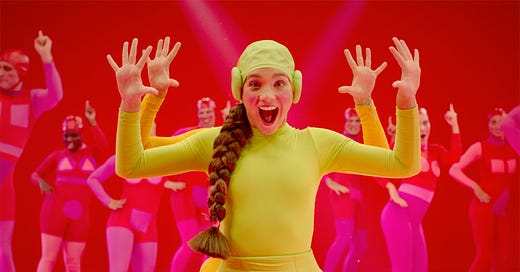As I plow away at the last couple chapters of the first draft of my book, aiming to be done with it and ready to edit by the end of March, I’ll continue sharing some excerpts here. This is from the chapter on neurodivergence in media, and before anything else I highly recommend you subscribe to Nathan Rabin’s Substack, where he’s been doing thoughtful, personal deep dives into how autism has been portrayed (mostly terribly) in film.
Decades following its release, autistic people tend to have a love-hate relationship with Rain Man. While it introduced the concept of autism to audiences in a thoughtful and sensitive way, portraying Raymond Babbitt as a human being who deserves respect, it also established several of the most common stereotypes of the disorder, which linger today. It wasn’t just Raymond’s quirks, such as demanding that Charlie schedule their road trip around what time The People’s Court is on, but his near-superhuman ability to solve complex math problems in his head, memorize books, and rattle off a wide range of statistics, including airline safety records. This became intrinsically associated with autism, even though (a) only about 1% of autistic people demonstrate “savant” capabilities (and even less at the level Raymond shows), and (b) Kim Peek, the real-life person this aspect of Raymond was modeled after, wasn’t even autistic.
Nevertheless, even into the 21st century, “Rain Man” would be used (often disparagingly) to describe people who lacked social skills but were unusually adept at puzzle and problem solving. Occasionally, as in 1998’s Mercury Rising and 2016’s The Accountant, those incredible skills are exploited for nefarious purposes. Other times, as in 2000’s Bless the Child and 2018’s The Predator, autistic children are treated as not just superhuman, but almost literally beyond human, their neurodivergence hiding the fact that they’re angels or able to communicate with aliens.
To be fair, portraying the less interesting (but likely more common) aspects of autism can occasionally backfire, as illustrated by 2011’s Extremely Loud and Incredibly Close. Adapted from Jonathan Safran Foer’s 2005 novel, it stars Thomas Horn as Oskar, a preteen autistic boy who journeys by foot all over New York City to solve a puzzle he believes was left for him by his father (Tom Hanks), who died on 9/11. No one seems to think it’s odd that a child is walking all over town unattended (not to mention that he’s somehow able to do this without his mother noticing), and the journey allows Oskar to not just get a peek into other people’s lives, but to eventually accept his father’s death.
One of the worst reviewed movies that was also nominated for a Best Picture Academy Award (it didn’t win), Extremely Loud and Incredibly Close was correctly criticized for being contrived, emotionally manipulative Oscar (Oskar?) bait. But some of the harsher reviews took aim directly at Oskar as a character, describing him as “creepy,” “weird,” “shrill,” and the reason some people are happy to be child-free. It’s possible that some critics didn’t realize that Oskar’s various tics and quirks, such as his aversion to loud noises, his flat affect, his lack of social cues, and his shaking a tambourine to comfort himself (it’s what’s called “stimming” now) were all common facets of neurodivergent behavior.
Yet, writer David Germain’s review noted “You make allowances in life for people you encounter with autism, but spending two hours with a fictional character possessing autistic qualities can be grating.” It was a bizarrely thoughtless observation, as if suggesting that Oskar should have “done autism” in a way that was less annoying to the audience, but unfortunately one that was too often reflected in real life attitudes towards neurodivergent people.
If Germain thought Extremely Loud and Incredibly Close was doing autism wrong, one wonders what he thought of The Fanatic (2019), and Music (2021). The Fanatic was written and directed by Limp Bizkit frontman Fred Durst, who clearly had some anger to work out both at his fans, and autistic people in general. Helping him with this catharsis was John Travolta, in a period where his decision whether or not to star in a movie depended on how quickly the check cleared.
Travolta, his hair cut in a way that suggests he fell head-first into a lawn mower, is Moose, an autistic Hollywood street performer. Though The Fanatic is a B-grade stalker thriller, Travolta, God bless him, performs as if he’s in Rain Man II. Often accused of sleepwalking through performances in the later half of his career, he really gave it his all here, plus more on top of that, plus some more piled on the side, plus wait, don’t go, he had a little more for you to take home in a bag. Is that your phone ringing? Answer it, it’s John Travolta acting some more.
All that effort went into playing one of the worst written “disabled” characters in recent memory, and one that Durst, like a schoolyard bully, relishes humiliating. Though Moose is at least in his fifties, he dresses like a sixth grader, complete with a colorful backpack flung over his shoulders, asks a bartender for a strawberry milkshake, and ends a conversation with “I can’t talk too long, I gotta poo.” Even before he starts stalking his favorite actor, he’s a collection of repugnant quirks created by people (Durst and co-writer Dave Bekerman) who’d just call him the r-word if they thought they could get away with it.
Don’t worry about feeling bad for finding Moose deeply unpleasant, because he has none of the “redeeming” qualities of autism, such as honesty, creativity, or intelligence. Nobody’s using him to crack codes or communicate with intergalactic hunters. All he knows how to do is smugly recite movie trivia, like Comic Book Guy from The Simpsons if he suffered a massive head injury. Other than that, he’s childish, temperamental, ungrateful to the precious few people who show him kindness, and he refuses to take no for an answer. He doesn’t just fail to recognize social cues, he walks into someone’s house uninvited, making himself at home and accidentally killing a maid, leaving her body out in the open.
Music is, incredibly, even worse than The Fanatic, if for no other reason than it was clearly made with good intentions. After all, no one expected the singer of “Nookie” to write a nuanced film about an autistic person. But there was no reason to think that singer Sia, in her screenwriting and directing debut, wouldn’t be capable of creating a thoughtful and compassionate portrayal of autism. Best known for her song “Breathe Me,” played during the devastating series finale of TV’s Six Feet Under, she spoke openly about her struggles with both mental and physical illness, and seemed to have the empathy required to take on such a potentially challenging project.
Nevertheless, to ask what went wrong with Music is too complicated. The correct question is what went right with it, which is nothing. Well, okay, that’s not entirely fair, some of the songs in it are okay, because among many of the curious creative decisions made in the production of this, it was turned into a musical at some point. That’s actually to its benefit, because the frequent elaborate song and dance numbers are a welcome respite from everything else that happens.
Another curious decision was to name the movie for someone who’s ultimately a supporting character at best. That’s Music Gamble, a young teenage girl with non-verbal autism played by Maddie Ziegler, who is not autistic. Because Ziegler was a literal child when Music was filmed, she cannot be held responsible for the performance she was directed to give, which was to play Music not as a person, but an appalling array of hand-flapping, eye-rolling, blankly grinning cliches. As numerous critics pointed out in reviews of Music, in creating Music as a character Sia must have taken artistic inspiration from 2008’s Tropic Thunder, and its trailer for a fake movie called Simple Jack, parodying actors who “go full retard” in the hopes of winning an Oscar.
All that effort, and she’s not even the main character anyway. That would be Music’s older sister Zu (short for Kazu, yes, really), played by Kate Hudson, a recovering alcoholic and former drug dealer who’s forced to become Music’s guardian after their grandmother dies. Because there’s inexplicably no social services caseworker, therapist, or even a school around to offer support, all Zu has to rely on for guidance is a handwritten “care and feeding” notebook kept by her grandmother, as if she’s been given custody of a puppy instead of a child with special needs.
But that’s okay, because thankfully the sisters have a bunch of saintly minority neighbors to look out for them. One of them, played by Leslie Odom, Jr., even has experience dealing with autistic children, and demonstrates that to Zu by promptly sitting on Music during a meltdown. This is what’s known as a “prone restraint,” and has become wildly unpopular in the past decade with autism advocates after it resulted in numerous deaths. Though Sia took every other criticism of Music poorly, she later acknowledged that she “listened to the wrong people” in depicting a prone restraint as an appropriate response to a meltdown, which was notable in that it was the only time she acknowledged listening to anyone during the making of it.
The primary issue with Music (other than everything else) is that, like a lot of movies that purport to be about a developmentally disabled, mentally ill, or terminally ill person, that person has no agency. The movie isn’t really about Music, but rather Zu, who isn’t much of a character herself beyond the “hot mess in a redemption arc” that Hollywood holds so dear.
Music is initially a problem for Zu to deal with, until she becomes inspiration for Zu to be a better person. She’s not the planet around which everything revolves, she’s a distant star off doing her own thing, which is mostly listening to music and fantasizing about garish, candy-colored musical numbers that unsurprisingly resemble the pop art style of Sia’s videos. As far as the audience knows, that’s all she thinks about.






And to think, that just a couple of years after her debacle of a film came and went, Sia was diagnosed to be on the autism spectrum herself! Which adds a fascinating and wild wrinkle to the existence of “Music” as one of the most appallingly offensive and retrograde depictions of autism ever seen in the history of motion pictures, right alongside Durst’s “The Fanatic”…
😳